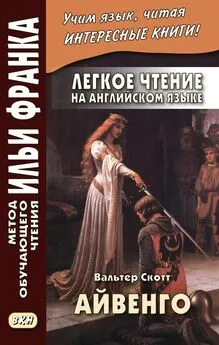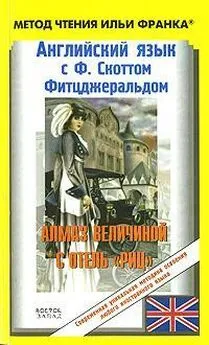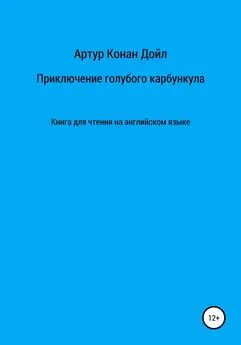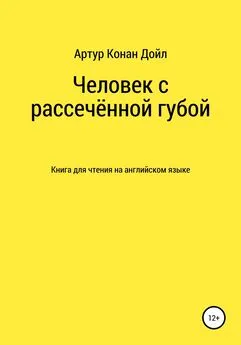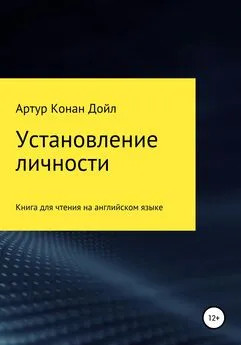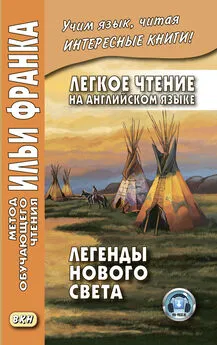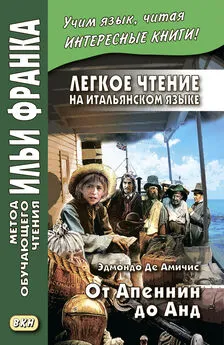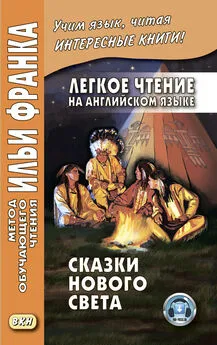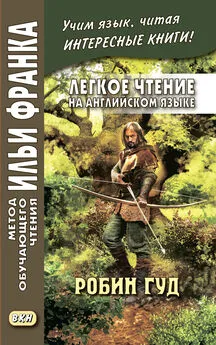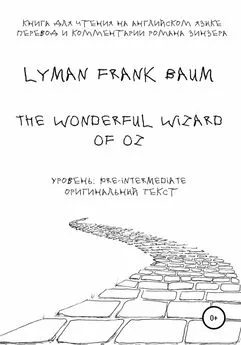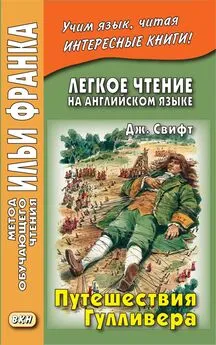Вальтер Скотт - Легкое чтение на английском языке. В. Скотт. Айвенго / Sir Walter Scott. Ivanhoe
- Название:Легкое чтение на английском языке. В. Скотт. Айвенго / Sir Walter Scott. Ivanhoe
- Автор:
- Жанр:
- Издательство:неизвестно
- Год:2022
- Город:Москва
- ISBN:978-5-7873-1910-1
- Рейтинг:
- Избранное:Добавить в избранное
-
Отзывы:
-
Ваша оценка:
Вальтер Скотт - Легкое чтение на английском языке. В. Скотт. Айвенго / Sir Walter Scott. Ivanhoe краткое содержание
Уникальность метода заключается в том, что запоминание слов и выражений происходит за счет их повторяемости, без заучивания и необходимости использовать словарь.
Пособие способствует эффективному освоению языка, может служить дополнением к учебной программе.
Для широкого круга лиц, изучающих английский язык и интересующихся английской культурой.
Легкое чтение на английском языке. В. Скотт. Айвенго / Sir Walter Scott. Ivanhoe - читать онлайн бесплатно ознакомительный отрывок
Интервал:
Закладка:
sharp[ʃɑ:p] , weapon[‘wepǝn] , real[rɪǝl] , winner[‘wɪnǝ] , receive[rɪ’si:v] , war-horse[‘wɔ:hɔ:s]
If he touched the shield with the back end of his lance, the two knights would fight with their lances covered, so that there was no danger to the horses or riders.
If the knight touched the shield with the point of his lance, however, the knights would fight against each other with sharp weapons, like in a real battle. At the end of the fighting, Prince John would announce the winner of the day’s tournament. The winner would receive a war-horse as a prize and have the honour of naming the Queen of Love and Beauty.
On the second day of the tournament(на второй день турнира) , all the knights would fight each other in two groups(все рыцари сражались другом с другом в двух группах = разделившись на два отряда) until Prince John announced the end of the tournament(до тех пор, пока принц Джон не объявит об окончании турнира; end – конец, край; конец, окончание ) . The Queen of Love and Beauty would then give a prize to the knight(королева любви и красоты вручала затем приз тому рыцарю) who had fought best on the second day(который сражался лучше всех во второй день) . Finally, at the very end(и наконец, в самом конце) , there would be an archery competition(устраивалось состязание лучников).
tournament[‘tʋǝnǝmǝnt; ’tɔ:], group[ɡru:p] , finally[‘faɪnǝlɪ]
On the second day of the tournament, all the knights would fight each other in two groups until Prince John announced the end of the tournament. The Queen of Love and Beauty would then give a prize to the knight who had fought best on the second day. Finally, at the very end, there would be an archery competition.
The herald ended his announcement by shouting(герольд завершил свое объявление, прокричав; announcement – объявление, сообщение; to announce – объявлять ) , “Love of ladies(любовь дам) – death of knights(смерть рыцарей) – honour and glory to the brave(честь и слава смелым; brave – мужественный, отважный, смелый, храбрый ) !” The audience cheered(зрители приветствовали /его/ громкими возгласами) and threw gold and silver coins down to him(и бросали золотые и серебряные монеты /вниз/ ему).
announcement[ǝ’naʋnsmǝnt] , death[deθ], glory[glɔ:rɪ] , audience[‘ɔ:dɪǝns]
The herald ended his announcement by shouting, “Love of ladies – death of knights – honour and glory to the brave!” The audience cheered and threw gold and silver coins down to him.
At the far end of the lists(в дальнем конце ристалища) , there were already so many knights on horses(уже находилось так много рыцарей верхом /на конях/) that the audience could only see a sea of shining helmets(что зрители могли видеть только море сверкающих шлемов; sea – водная поверхность земного шара; море; большое количество, большое пространство /чего-либо/; to shine – светить, освещать /чем-либо/; светиться; блестеть, сиять, сверкать; helmet – шлем ) . With the eyes of the crowd on them(взоры толпы были обращены на них /когда/: «с глазами толпы на них»; eye – глаз; око; взгляд, взор ) , the first five knights rode forward to the tents of the five challengers(первые пятеро рыцарей поскакали вперед, к шатрам пяти зачинщиков турнира).
already[ɔ:l’redɪ] , shining[‘ʃaɪnɪŋ] , helmet[‘helmɪt]
At the far end of the lists, there were already so many knights on horses that the audience could only see a sea of shining helmets. With the eyes of the crowd on them, the first five knights rode forward to the tents of the five challengers.
Each knight touched the shield of one of the challengers(каждый рыцарь коснулся щита одного из зачинщиков) with the back end of his lance(тупым: «задним» концом своего копья) and rode back to the end of the lists(и поскакал назад, к /другому/ концу ристалища) . The challengers, led by the Templar(зачинщики /турнира/, ведомые рыцарем храма = под предводительством тамплиера; to lead – вести, сопровождать ) , then mounted their horses(тогда вскочили на своих коней; to mount – подниматься, восходить; садиться /на лошадь,/ ) and rode to the opposite end of the lists(и поскакали к противоположному концу ристалища; opposite – расположенный, находящийся напротив, противоположный ).
knight[naɪt] , mounted[‘maʋntɪd], opposite[‘ɔpǝzɪt]
Each knight touched the shield of one of the challengers with the back end of his lance and rode back to the end of the lists. The challengers, led by the Templar, then mounted their horses and rode to the opposite end of the lists.
At the sound of the herald’s trumpet(при звуках трубы герольда) the two sides galloped towards each other(противники: «две стороны» поскакали галопом = во весь опор навстречу друг другу; to gallop – скакать галопом, галопировать; скакать во весь опор /о всаднике на лошади/; towards – к, по направлению к ) . The crowd heard the lances break(толпа услышала, как ломаются копья) and saw that the challengers had knocked four of the knights off their horses(и увидела, как зачинщики турнира вышибли четырех рыцарей из /их/ седел: «с лошадей»; to knock – стучать; ударять, бить; to knock off – стряхивать, смахивать; разбивать /соперника, оппонента/; сбивать, сшибать, сносить ).
trumpet[‘trʌmpɪt] , gallop[‘ɡælǝp], towards[tǝ’wɔ:dz]
At the sound of the herald’s trumpet the two sides galloped towards each other. The crowd heard the lances break and saw that the challengers had knocked four of the knights off their horses.
The challengers rode back to their tents(зачинщики турнира поскакали назад, к своим шатрам; to ride ) and the defeated knights dragged themselves out of the lists(а поверженные рыцари потащились с арены; to defeat smb. – одержать победу /над кем-либо/, наносить поражение /кому-либо/; to drag – тянуть, тащить, волочить ) . A second and third group of knights came to fight against the challengers(вторая и третья группа рыцарей приезжали сражаться с зачинщиками турнира) , but they were no more successful(но они не были более успешными /в борьбе/; success – удача, успех, благоприятный исход; successful – благополучный, счастливый, удачный, успешный ) against the Templar and his fellow challengers(против храмовника и его друзей-зачинщиков турнира; fellow – приятель, товарищ, коллега, собрат ).
defeated[dɪ’fi:tɪd] , successful[sǝk’sesf(ǝ)l], fellow[‘felǝʋ]
The challengers rode back to their tents and the defeated knights dragged themselves out of the lists. A second and third group of knights came to fight against the challengers, but they were no more successful against the Templar and his fellow challengers.
When the crowd saw(когда толпа увидела = зрители увидели) that there were only three knights in the fourth group(что было только три рыцаря в четвертой группе) , they became very quiet(они притихли: «они стали очень тихими»; quiet – тихий, бесшумный, неслышный; молчащий; молчаливый ) , and whispered to each other(и шептались: «и шептали друг другу») that the Norman challengers were going to win the day’s tournament(что норманны-зачинщики турнира выиграют сегодняшний турнир).
fourth[fɔ:θ] , quiet[‘kwaɪǝt], whisper[‘wɪspǝ]
When the crowd saw that there were only three knights in the fourth group, they became very quiet, and whispered to each other that the Norman challengers were going to win the day’s tournament.
Cedric the Saxon was very unhappy with the outcome(Седрик Сакс был очень недоволен исходом /турнира/; happy – счастливый, довольный; unhappy – несчастливый; несчастный; грустный, подавленный; outcome – исход, итог, последствие, результат ) and he turned to Athelstane(и он повернулся = обратился к Ательстану).
“The day is against England, my lord(этот день неудачен для Англии: «против Англии» = сегодня Англия проиграла битву, мой господин; day – день; решающий день, битва, сражение; тж. the day is against us – мы проиграли битву, все кончено, наше дело – табак ) ,” he said to Athelstane. “Aren’t you going to take up your lance(разве вы не собираетесь поднять ваше копье; to take up – обсуждать /план и т. п,/; поднимать ) ?”
Читать дальшеИнтервал:
Закладка:
